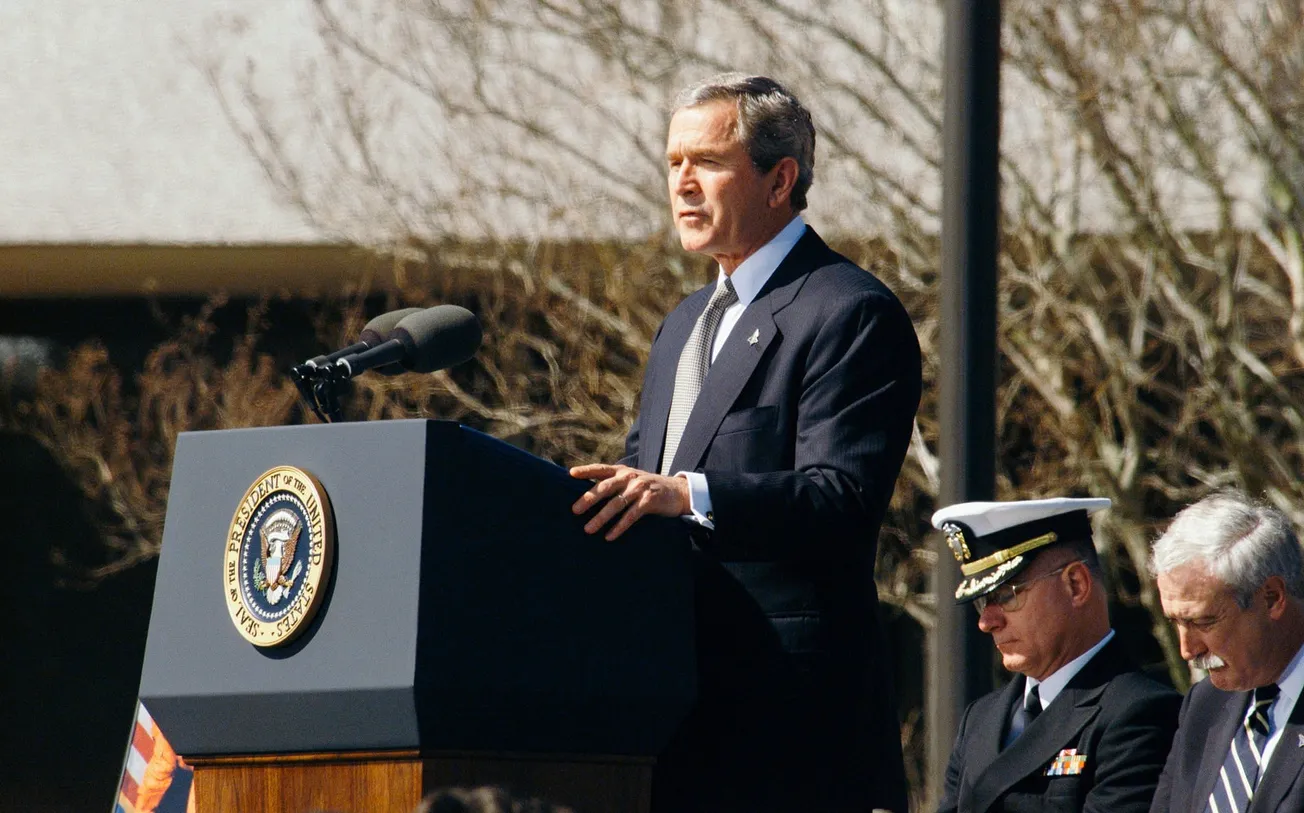Table of Contents
Dan Sanchez
fee.org
Dan Sanchez is the Director of Content at the Foundation for Economic Education (FEE) and the editor-in chief of FEE.org.
During his presidency, George W Bush became known for his “Bushisms”, which Wikipedia describes as “unconventional statements, phrases, pronunciations, Freudian slips, malapropisms, as well as semantic or linguistic errors in the public speaking of former President of the United States George W Bush”.
On Wednesday, Bush gave us yet another Bushism, and it was one for the history books.
While delivering a speech in Dallas, Bush condemned “the decision of one man to launch a wholly unjustified and brutal invasion of Iraq… I mean of Ukraine.” He then joked about his gaffe, saying “Iraq too. Anyway… I’m 75,” drawing laughter from the audience.
Though he tried to downplay it as a senior moment, Bush’s latest Bushism was more likely a Freudian slip. In misspeaking, he spoke the truth.
After all, it was President George W Bush who actually launched the invasion of Iraq, which, like Russian President Vladimir Putin’s invasion of Ukraine, was indeed “wholly unjustified and brutal”.
As for its brutality, the Iraq War killed tens (maybe even hundreds) of thousands and involved such war crimes as the use of torture in Abu Ghraib, the Haditha and Nisour Square massacres and the use of white phosphorous as an incendiary weapon in Fallujah.
And, as most now recognise, the invasion of Iraq was indeed wholly unjustified.
As the BBC noted in its report on Bush’s gaffe, “Mr Bush was president during the US-led invasion of Iraq in 2003 over weapons of mass destruction that were never found.”
His administration’s showcase performance in its push for the war was Secretary of State Colin Powell’s dramatic presentation to the UN security council of alleged evidence of Saddam Hussein actively developing WMDs.
Later, President Bush performed a comedy bit about never being able to find those WMDs at a White House Correspondents’ Dinner. As he demonstrated again yesterday, Bush seems to have a knack for playing up his guilt in an atrocity for chuckles.
A second major justification for the Iraq War also proved false: as a 2021 article published by the Brookings Institution noted, “the Bush administration misled the American public into believing that Iraq was connected to the September 11 attacks…”
The US government, crucially abetted by the establishment media, lied America into a brutal and unjustified war by propagating a false narrative that was insulated from independent critique until it was too late. And it was neither the first nor the last time that happened.
That is essential for Americans to keep in mind in the face of today’s wars and in light of today’s campaign against “misinformation”. Governments and establishment media companies (including Big Tech companies) are pushing relentlessly for more centralised narrative control, especially concerning war.
See, for example, the Department of Homeland Security’s recently announced Disinformation Governance Board, nicknamed the “Ministry of Truth” by critics whose outraged response caused the Biden administration to “pause” the new agency.
According to AP News, the board’s purpose was to…
“…monitor and prepare for Russian disinformation threats as this year’s midterm elections near and the Kremlin continues an aggressive disinformation campaign around the war in Ukraine. Russia has repeatedly waged misinformation campaigns aimed at US audiences to further divisions around election time and spread conspiracy theories around US COVID-19 vaccines”.
And yesterday, Twitter introduced its new “crisis misinformation policy”, which will be harmonised with the United Nations and major NGOs and will especially focus on “misinformation” related to armed conflicts, including:
- False coverage or event reporting, or information that mischaracterises conditions on the ground as a conflict evolves;
- False allegations regarding use of force, incursions on territorial sovereignty or around the use of weapons;
- Demonstrably false or misleading allegations of war crimes or mass atrocities against specific populations;
- False information regarding international community response, sanctions, defensive actions or humanitarian operations.
The announcement notes that, “this first iteration is focused on international armed conflict, starting with the war in Ukraine…”
Countering “disinformation” and “misinformation” may sound like a sensible, responsible policy. But, as we saw with the Iraq War and in countless other instances, governments and government-tied media companies are not to be trusted with managing ‘the narrative’, especially concerning war.
As Senator Rand Paul said recently while grilling DHS Secretary Alejandro Mayorkas over his agency’s Disinformation Governance Board, “I don’t trust government to figure out what the truth is. Government is largely disseminating disinformation.”
The more that public discourse is centrally managed, the easier it will be for governments to manipulate the public, and especially to lie us into “brutal” and “unjustified” wars again.
The former president’s Freudian Bushism may betray a guilty conscience tormented by the ghosts of Iraq. To a degree, we should all be haunted by that war’s bloody legacy. But, we can partially redeem that tragic atrocity by rejecting policies that pave the way for future ones.
This article was originally published on FEE.org. Read the original article.








